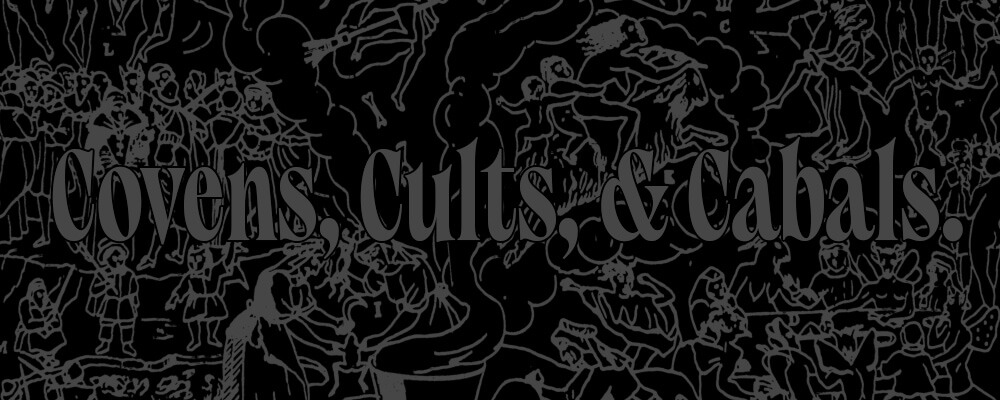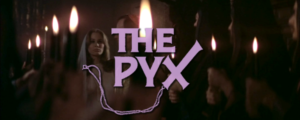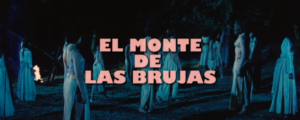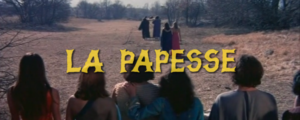
There’s something diabolically attractive about being in a cult. The acceptance, the belonging, the fun new name they give you. But there’s also something horribly distrustful about them. Their secrecy, their brainwashing, and what they must get up to behind closed doors. The horrors they must be perpetuating upon the good people of this planet. At least that’s what we assume, they wouldn’t let us join the fun. We can only expect (and showcase) the worst…
This Spectober, join us as we carve out a small selection of international films surrounding one our most beloved macabre subjects: the evil ritualistic conspiracy.

THE PYX
(aka THE HOOKER CULT MURDERS)
Dir. Harvey Hart, 1973
Canada. 107 min
In English
TUESDAY, OCTOBER 3 – 7:30 PM
FRIDAY, OCTOBER 20 – 5 PM
THURSDAY, OCTOBER 26 – 7:30 PM
This October is the 50th Anniversary of Harvey Hart’s diabolical thriller THE PYX. In order to honor the occasion, we’ve decided to resurrect this Spectacle Classic, which originally screened in 2015 and subsequently streamed as part of SPECTOBER IN EXILE following the onset of the Covid-19 Pandemic.
Somewhere between ROSEMARY’S BABY and KLUTE, this Canadian supernatural mystery offers plenty to satisfy police procedural fans as Dr. Sgt. Jim Henderson (played by Christopher Plummer) investigates the murder of Elizabeth Lucy (Karen Black). As the film moves back and forth between Henderson’s investigation and Lucy’s last days we learn of her connection to a cult of devil worshipers.
While other films would try to drive up the tension, there’s a quiet, sullen feel to THE PYX, from the grubby rain-soaked streets of Montreal to Lucy’s manipulative madam to the minimal orchestral score, supplemented by Karen Black’s songs, all of which build a slow sense of inescapable dread. Lucy’s conflagration of sex, heroin and Catholicism drifts through the entire film, a counterpoint to the increasing paranoia and futility of the detectives seeking to understand what remains beyond them as both storylines mirror the downward spiral of the other.

EL MONTE DE LAS BRUJAS
(THE WITCHES MOUNTAIN)
Dir. Raúl Artigot, 1972
Spain. 86 min
In Spanish with English subtitles
TUESDAY, OCTOBER 3 – 10 PM
MONDAY, OCTOBER 16 – 10 PM
SUNDAY, OCTOBER 29 – 5 PM
After an opening that a written description would only spoil, Carla shows up unannounced at the home of her (ex?)boyfriend, Mario, who wants little to do with her. To avoid Carla, Mario forgoes his vacation time and heads north to the mountains on assignment as a photojournalist. Arriving at a beach, Mario, and his godlike handlebar mustache, luridly comes across a young sunbather named Delia. Smitten, Delia decides to join Mario on his assignment and the two head deep into the mountains. What follows is a sequence of bizarre and unsettling events: strange cloaked men lingering outside the windows of a mountain inn, the theft of Mario’s car by an unknown entity, unexplainable photographic anomalies, and a nighttime funeral procession. What or who is behind these strange occurrences? What fate is in store for Mario? And what does it have to do with Carla?
What the film may lack in plot and coherence, it more than makes up for in its ethereal mood and striking atmosphere. The true star being the mountains of northern Spain, who’s ancient harsh landscape coated in lush vegetation already feels haunted in its appearance alone. Raúl Artigot’s career was more often spent in the role of cinematographer, having worked on such features as CANNIBAL MAN, THE GHOST GALLIEN, THE EROTIC RITES OF FRANKENSTEIN and many more. WITCHES MOUNTAIN would be his directorial debut, and only one of his 3 total features. Knowing this, the film’s tendency for style-over-story makes perfect sense (as well as Mario’s profession). If you enjoyed Spectacle’s summer screenings of LE ORME, and the vibes it exuded, WITCHES MOUNTAIN may be right for you.
Similar to LA PAPESSE, WITCHES MOUNTAIN was banned in its home country (fuck you Franco), and gained an undeserved reputation for being violent and misogynistic due to its censorship. However, it should be noted that the film only appeared in front of investigators/censors because some of the actors in the film felt they were being shortchanged on night shoots and in wanting fair compensation snitched to the review board. In light of the recent and ongoing SAG and writer’s union strikes, we must point out that this could be your film’s fate if you skimp on paying your workers. Languishing in obscurity for decades, and then having a short run at an ex-bodega in Brooklyn for $5 tickets. Chilling.
Special thanks to Mondo Macabre.

LA PAPESSE
(THE POPESS or THE HIGH PRIESTESS; aka A WOMAN POSSESSED)
Dir. Mario Mercier, 1975
France. 94 min
In French with English subtitles
SATURDAY, OCTOBER 7 – MIDNIGHT
THURSDAY, OCTOBER 19 – 10 PM
MONDAY, OCTOBER 30 – 10 PM
CONTENT WARNING: This film contains violence against animals and depictions of rape.
Laurent and Aline are newlyweds. Laurent is a self-described artist who pines for a life of hedonism amongst the local sex cult, and to learn the teachings of its Popess. Aline? Not so much. They squabble over the direction of their lives. To Laurent’s dismay, the cult isn’t interested in only him, they want his wife as well. In order to overcome Aline’s reluctance, the cult begins a process to break her down including, but not limited to: flogging, drugs, imprisonment, branding, the male gaze, animal sacrifice, and a poison challenge akin to THE PRINCESS BRIDE’s Battle of Wits. A tale of warning for those who seek acceptance from the right crowd to further their art careers.
The cult’s Popess, from whom Laurent seeks absolution, is a dark-haired woman named Géziale, played by—get this—a mysterious woman named Géziale. She has no other on-screen credits and is purported to be an actual occultist leader. Is she real? At what point does the film blur between fiction and documentary? Are we seeing a retelling of the occult dabblings of director Mario Mercier and his initiation into a magical sect lead by the very same Géziale? Or is this just BLAIR WITCH levels of marketing and promotion?
With a firm grasp of the ritual practices of esotericism and occult magic, LA PAPESSE finds itself sitting comfortably within the venn diagram of psychedelica and S&M/fetish/power and domination play. Featuring quite inventive lo-fi camera and editing work that may be the film’s most redeeming and inspiring qualities. Mercier achieves beautiful images and sequences, some of which bring fellow magician Kenneth Anger’s oeuvre to mind.
Despite some of its more extreme contents, LA PAPESSE is often unfairly derided as euro-sleaze trash. This assessment was fueled by the French government’s censorship of the film upon its release. Originally pulled in its first week and re-released with an X rating (or the French equivalent?) back into the pornography theater circuit where it was not well received. Not sleazy enough for the porn theaters, but too sleazy for the general public. This censorship process seemingly ended Mercier’s short filmmaking career, with him choosing to shift his focus back to writing, painting and practicing shamanism.
And is it just me, or does the film’s theme music bear a remarkable resemblance to Wendy Rene’s After Laughter?
